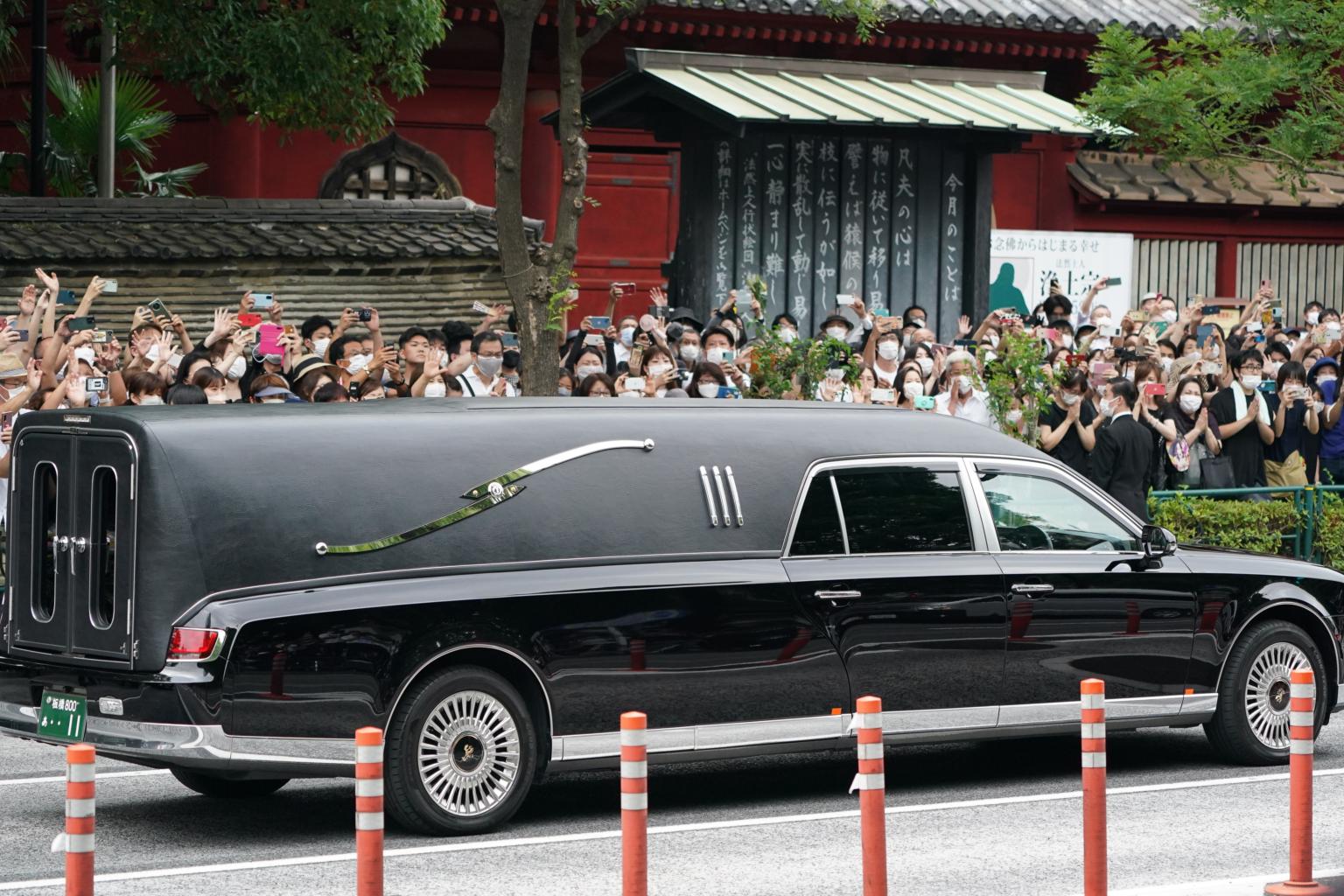Japan approves Sept 27 state funeral for Shinzo Abe, sparking protests
Sign up now: Get insights on Asia's fast-moving developments

A vehicle carrying the body of Mr Shinzo Abe leaves Zojo-ji Temple at the end of the funeral procession in Tokyo, on July 12.
PHOTO: EPA-EFE
Follow topic:
TOKYO (AFP, REUTERS) - Japan will hold a state funeral for assassinated former prime minister Shinzo Abe on Sept 27, the government announced on Friday (July 22), with foreign leaders expected to attend.
The ceremony will be held at Tokyo's Nippon Budokan, a large venue that has hosted concerts and sports events, and was used for Japan's last state funeral for a former prime minister in 1967.
Government spokesman Hirokazu Matsuno said Abe's record as Japan's longest-serving prime minister, his "truly praiseworthy" achievements, and his ties with foreign leaders made a state funeral appropriate.
"We will also accept foreign dignitaries, and countries we have diplomatic relationships with will be informed of details," he added.
Abe was gunned down on the campaign trail on July 8 in the western city of Nara. His accused killer, Tetsuya Yamagami, is in custody and reportedly targeted Abe because he believed the former leader was linked to the Unification Church.
Yamagami's mother is reported to have made large donations to the church, which her son blamed for the family's financial difficulties.
A small private funeral for Abe was held at a temple in Tokyo shortly after his death, with thousands of people gathering outside to lay flowers and offer respects.
The September ceremony will be only the second state funeral for a former prime minister in post-war Japan, after that of Shigeru Yoshida, who led the country following World War II.
Matsuno said the event would be "non-denominational, simple and sombre", adding that costs were still being studied.
The funeral will be fully paid for by state funds likely to be taken from the budget reserve, he said.
The last state funeral for an ex-prime minister paid for fully by state funds was in 1967, with successive funerals paid for partly by the state and partly by the LDP.
The current plan has triggered growing disquiet. Around 200 people gathered near the PM’s office in Tokyo to protest the decision, according to the Kyodo news agency, and on social media objections ranged from the use of taxpayer funds, to complaints the government may seek to make political capital of Abe’s death and cement his legacy.
On Thursday, 50 people filed for an injunction in a Tokyo court seeking a halt to the use of public funds for the event, saying there should have been more discussion before making a decision.
The last state funeral for an ex-prime minister paid for fully by state funds was in 1967, with successive funerals paid for partly by the state and partly by the LDP.
The current plan has triggered growing disquiet. Around 200 people gathered near the PM’s office in Tokyo to protest the decision, according to the Kyodo news agency, and on social media objections ranged from the use of taxpayer funds, to complaints the government may seek to make political capital of Abe’s death and cement his legacy.
On Thursday, 50 people filed for an injunction in a Tokyo court seeking a halt to the use of public funds for the event, saying there should have been more discussion before making a decision.
Only 49 per cent supported the idea of a state funeral in a recent public opinion poll by public broadcaster NHK, and the topic was trending on social media on Friday.
On Twitter, a user with the handle ‘Yuki no Imogai’ posted,“(Prime Minister Fumio) Kishida always bragged he listens to the people, so why isn’t he doing it now?”
On Twitter, a user with the handle ‘Yuki no Imogai’ posted,“(Prime Minister Fumio) Kishida always bragged he listens to the people, so why isn’t he doing it now?”
Others contrasted the plan with the government response to the Covid-19 pandemic, with new cases surging to record levels in Japan this week.
“Given they’re doing next to nothing about the pandemic, how did they manage to decide this so quickly?”, posted Twitter user Heron.
“Take the money you’ll use for the funeral and do something about the coronavirus.”
“Given they’re doing next to nothing about the pandemic, how did they manage to decide this so quickly?”, posted Twitter user Heron.
“Take the money you’ll use for the funeral and do something about the coronavirus.”
Abe was Japan's best-known politician, maintaining a prominent place in public life even after resigning in 2020 for health reasons.
But he was also a divisive figure who faced cronyism allegations and was criticised for his staunch nationalist views.

